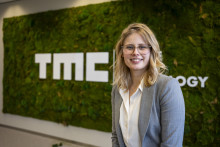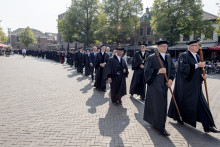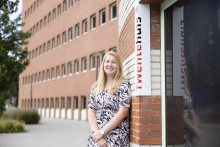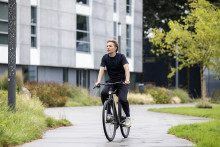‘At the beginning I was very lost’
‘I graduated right in the middle of the first wave. The day after graduation, I applied for the search year visa, which allows you to stay in the Netherla nds for a year while you look for a job. It was pretty bad at first. It’s hard enough to search for a job if you don’t speak Dutch, but many institutes were not working at full capacity, and therefore not hiring. It was difficult to even get a response. I basically didn’t hear anything from anyone in May and June. I had to self-finance everything. I didn’t have any sort of scholarship and it gets difficult without an income.
nds for a year while you look for a job. It was pretty bad at first. It’s hard enough to search for a job if you don’t speak Dutch, but many institutes were not working at full capacity, and therefore not hiring. It was difficult to even get a response. I basically didn’t hear anything from anyone in May and June. I had to self-finance everything. I didn’t have any sort of scholarship and it gets difficult without an income.
The corona specific issue was that many companies uploaded job vacancies on websites, such as LinkedIn, but the jobs weren’t updated. Quite often the jobs didn’t exist anymore because of the pandemic. As a candidate, you then spend a lot of time preparing letters and your CV for a job that doesn’t exist anymore. That was one of the biggest struggles. In the end I sent an open application to the UT and I got a temporary position as a lecturer of psychology. This was exactly the type of job I was looking for, but it was not an advertised position. It’s a temporary position for six months, and hopefully my contract can get extended, otherwise I will be worried.
‘It was difficult to even get a response’
I really wished someone from the UT would speak to us, graduates, about what we needed to do to navigate the job market during the corona crisis. It would have been nice to have some guidance. At the beginning I was very lost. I had no idea who to contact. Also, just getting up in the morning and sending job applications all day, gets quite monotonous – especially during a pandemic.’
‘Everything was frozen’
‘My plan after graduation was to get some job experience through a long-term internship. Luckily, this worked out and I got a six months internship at an aviation technology company in Hamburg. Instead of finishing in May, I was planning to extend it until September 2020. All seemed completely settled and everything was fine until March came around. I did not receive my new contract at that point and as the aviation industry was expecting larger challenges in general. Everything was frozen. Many projects were cancelled, everything was being restructured. That worried me a lot, especially because of housing. It took a very long time to get an answer on whether I could stay – I knew only a couple of weeks before my contract expired. In the end it all worked out, but I had so many doubts.
‘I had to sit it out’
 Similar issue came up when I started looking for a Master’s study. It was already difficult enough because I had a Dutch degree and I wanted to study in Germany. On top of that, there was the corona crisis and communication, especially over the phone, was often not possible. I applied at four different universities, but I didn’t hear back for a long time. I was just waiting and waiting and waiting. You can’t do anything else and you can’t apply at other universities because the deadlines have passed. Once again, I had to sit it out.
Similar issue came up when I started looking for a Master’s study. It was already difficult enough because I had a Dutch degree and I wanted to study in Germany. On top of that, there was the corona crisis and communication, especially over the phone, was often not possible. I applied at four different universities, but I didn’t hear back for a long time. I was just waiting and waiting and waiting. You can’t do anything else and you can’t apply at other universities because the deadlines have passed. Once again, I had to sit it out.
One university eventually replied, but I didn’t get in. At that university, acceptance is granted based on a combination of grades and extra experiences, such as going abroad or doing an internship. However, this year they only looked at the grades as Covid-19 made it impossible to go abroad for some people. This drastically lowered my score and I didn't get accepted. I basically didn’t stand a chance. That was a bummer. Luckily, once again last minute, I got accepted at a different university.
‘It is hard to hold on until the last minute’
The biggest issue is the uncertainty. I got lucky and it all worked out, but it is hard to hold on until the last minute. But in the corona time, the only way is to hope and hold on. I’m also lucky that I’m still a student. If you need to enter the job market or need to find an internship, then you are in real trouble. Although I’m curious about how it will be to move to a new city now. It is not yet clear how the education will look. I’m a bit worried about moving and not having any proper introduction to new study and fellow students.’
‘It felt like every job opportunity simply vanished’
‘After graduation I first travelled for a month and then I started to search for a job. It was difficult because I didn’t really know what I wanted to do and what my skills were. The study is quite new and it was hard for me to define what I was capable of. When I finally figured it out, the coro navirus hit us. I reacted to a lot of vacancies, but the problem was that many of them got withdrawn. Everything – especially in the healthcare sector – just stopped. They had other issues to deal with than new jobs. In three or four cases I even got invited to an interview, but then it got suddenly cancelled. The job vacancies just disappeared. That was really hard for me.
navirus hit us. I reacted to a lot of vacancies, but the problem was that many of them got withdrawn. Everything – especially in the healthcare sector – just stopped. They had other issues to deal with than new jobs. In three or four cases I even got invited to an interview, but then it got suddenly cancelled. The job vacancies just disappeared. That was really hard for me.
I was trying for a few months, but there seemed to be no jobs. In May I decided to turn it around. It was obvious that businesses needed to find ways to deliver care over distance, through technology. And I thought: that is where I come in. I started trying again. I put a message on LinkedIn, reaching out to companies who needed to implement new technologies to work with their patients. That is exactly what I learnt to do: to implement new technologies into the existing healthcare system. And that is how I got my current job. Since August 2020 I’m a project manager for company that provides software to healthcare organizations.
‘The job vacancies just disappeared’
The hardest part of searching for a job during the corona crisis was definitely the withdrawn vacancies. It felt like every job opportunity simply vanished. I was wondering whether I would ever find a job. Without corona, I think the process would be very different and I would find a job much sooner.’
‘I found a job relatively easily’
‘The corona crisis actually didn’t change my plans. My plan was to start looking for a job a few months before graduation and that is also what I did. I was searching for a job right in the middle of the corona crisis, but I actually didn’t find any restrictions that would hinder me in the search. Of course there were measures in place – such as keeping distance and doing interviews digitally -, but it didn’t bother me. I got hired quickly after graduation. I got a job as a research fellow at the Epilepsy clinic Netherlands, a specialized center focusing on epilepsy and sleep disorders. Now I work partly at home and partly in the office. It is fine now, but it was a bit hard in the beginning because there was nearly nobody in the clinic. I was alone and didn’t know how to start up, but it improved.
I was searching for a job right in the middle of the corona crisis, but I actually didn’t find any restrictions that would hinder me in the search. Of course there were measures in place – such as keeping distance and doing interviews digitally -, but it didn’t bother me. I got hired quickly after graduation. I got a job as a research fellow at the Epilepsy clinic Netherlands, a specialized center focusing on epilepsy and sleep disorders. Now I work partly at home and partly in the office. It is fine now, but it was a bit hard in the beginning because there was nearly nobody in the clinic. I was alone and didn’t know how to start up, but it improved.
I’m not sure if I was lucky or if I found a job relatively easily thanks to the field I work in. It might be because I was searching primarily for PhD positions, which are jobs established ahead of time and with some secured funding. Moreover, as a PhD you can first spend time doing literature research. However, I didn’t hear any stories from my classmates indicating that they had troubles finding a job. I know people who had trouble getting clinical internships, needed right before graduation, but I didn’t get the feeling that graduates had issues entering the job market.’
'It feels unreal'
‘I got really lucky. I applied for my current job back in December 2019 and started it right after graduation, in July. I’m a Systems Engineer in training with Cisco, an American company with their Dutch office in Amsterdam. It is a graduate program for young people who are just starting with their professional careers. Originally, we were meant to start with 103 people, but now it is only six of us. The entire program is now virtual and I have not met my manager nor my coworkers – only some of them and only unofficially.
‘Starting a career virtually has been challenging’
It fee ls unreal. I take my responsibilities seriously, but my new job doesn’t feel real in a way. I don’t have an office, I don’t have a badge with my name, I have never even been inside the company’s building. Starting a career virtually has been challenging. I’m a very outgoing person and definitely not shy. However, there are a thousand people working in the company. Even though we are encouraged to connect with colleagues, doing so via email and virtual meetings does not feel natural. Because of that I feel like I am missing out on valuable opportunities for my career development which otherwise would happen during coffee and lunch breaks at the office.
ls unreal. I take my responsibilities seriously, but my new job doesn’t feel real in a way. I don’t have an office, I don’t have a badge with my name, I have never even been inside the company’s building. Starting a career virtually has been challenging. I’m a very outgoing person and definitely not shy. However, there are a thousand people working in the company. Even though we are encouraged to connect with colleagues, doing so via email and virtual meetings does not feel natural. Because of that I feel like I am missing out on valuable opportunities for my career development which otherwise would happen during coffee and lunch breaks at the office.
I really struggled with leaving the safe environment of the UT, where I had a lot of friends, joined many associations and so on. In this situation, the transition from student life to adulthood is very difficult. It robs me of many opportunities to connect with people beyond my screen. Everything is closed, you can’t just go out and meet people in a bar or at a party. How do you socialize? I really want to make new friends here in Amsterdam, but it has been difficult for me.
‘A lot of young people are now following a different path’
I think these circumstances are a challenge for alumni which has been underestimated so far. Building a new life in a new city, virtually and from home is not easy. Career and professional development from my living room is definitely an additional difficulty in this next chapter in my life. I know classmates who have decided to extend their studies at the UT, just because it was safer and more comfortable for them. A lot of young people are now following a different path than they normally would and their career might be impacted by this. I think that quite a few people will have an unexpected pivot in their professional or academic career. And in five or ten years, will people still understand that this was due to corona? I think this situation will have a lasting impact.’







